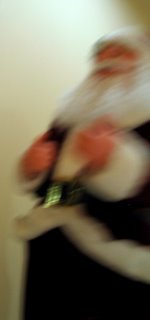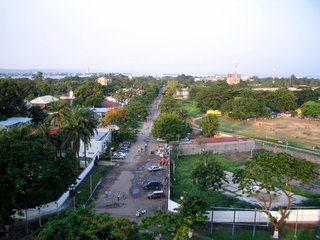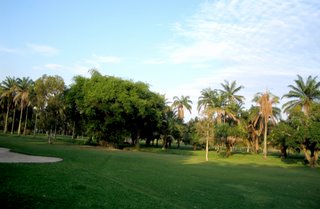More information from BBC website
.
.
.
.
.
.
.
.
.
Carine's news



 Here, as in Jerusalem, war and its aftermath remain tangible realities, ones that permeate through all aspects of life, not least the upcoming constitutional referendum on Sunday. Here, the lingering TV images lose their remoteness, but also to some extent their intensity, their fascination. Because the truth is that life continues, people just carry on. Only a few years after the terror and bloodshed, while people continue to live in an atmosphere of insecurity and fear, the vibrancy and dynamism in the town is rampant, an optimism and eagerness born out of sheer determination and the burning desire to live in peace. To me, this ability to simply pick up the pieces and start again with such energy and good will is as mysterious a characteristic of human nature as the propensity for perpetrating the kinds of horrors that people here and elsewhere have suffered and continue to suffer.
Here, as in Jerusalem, war and its aftermath remain tangible realities, ones that permeate through all aspects of life, not least the upcoming constitutional referendum on Sunday. Here, the lingering TV images lose their remoteness, but also to some extent their intensity, their fascination. Because the truth is that life continues, people just carry on. Only a few years after the terror and bloodshed, while people continue to live in an atmosphere of insecurity and fear, the vibrancy and dynamism in the town is rampant, an optimism and eagerness born out of sheer determination and the burning desire to live in peace. To me, this ability to simply pick up the pieces and start again with such energy and good will is as mysterious a characteristic of human nature as the propensity for perpetrating the kinds of horrors that people here and elsewhere have suffered and continue to suffer. As I sit here typing away on my laptop, the tranquillity is regularly disturbed by low-flying planes and helicopters, most of which are white UN aircraft carrying vehicles, radios, election kits, as well as international observers who have volunteered from all over the world to come monitor the elections. And then there are the tens of thousands of Congolese who are being deployed throughout a country four times the size of France, with absolutely no road infrastructure whatsoever, to make this referendum happen: 52,000 election agents, over 40,000 police officers, some 50,000 domestic observers, all travelling on trucks, motorcycles, horses, by boat, on foot… It’s unimaginable.
As I sit here typing away on my laptop, the tranquillity is regularly disturbed by low-flying planes and helicopters, most of which are white UN aircraft carrying vehicles, radios, election kits, as well as international observers who have volunteered from all over the world to come monitor the elections. And then there are the tens of thousands of Congolese who are being deployed throughout a country four times the size of France, with absolutely no road infrastructure whatsoever, to make this referendum happen: 52,000 election agents, over 40,000 police officers, some 50,000 domestic observers, all travelling on trucks, motorcycles, horses, by boat, on foot… It’s unimaginable.

 I’m walking down one of the many empty corridors in this labyrinth of a hotel, the only sound is the click-click of my heels on the polished marble floor (yes, it’s that kind of hotel), when suddenly this mechanical voice booms out at me from nowhere a 1980s rock-and-roll rendition of “Santa’s Coming to Town”. My heart leaps to my mouth in fright, my legs end up somewhere around my ears as I turn to face my aggressor and find myself confronted with a child-sized all-singing, all-dancing plastic Santa clad in bright red velvet, frantically wriggling his booty left, right and centre, and grinning at me in an apparent thrill of ecstasy.
I’m walking down one of the many empty corridors in this labyrinth of a hotel, the only sound is the click-click of my heels on the polished marble floor (yes, it’s that kind of hotel), when suddenly this mechanical voice booms out at me from nowhere a 1980s rock-and-roll rendition of “Santa’s Coming to Town”. My heart leaps to my mouth in fright, my legs end up somewhere around my ears as I turn to face my aggressor and find myself confronted with a child-sized all-singing, all-dancing plastic Santa clad in bright red velvet, frantically wriggling his booty left, right and centre, and grinning at me in an apparent thrill of ecstasy. Everything appears to be slightly more complicated than it needs to be every step of the way. For instance, when I went to the bank to open an account, I was informed that I had to make an initial cash deposit of US$10,000, no less! When I explained that all I needed for the moment was an account into which I could make a transfer from London, the woman flashed me a sadistic smile and repeated slowly, as if I were a distracted child, that the deposit had to be made in cash. When, allowing a tiny note of sarcasm to creep into my voice, I asked whether I was expected to bring the US$10,000 cash in a suitcase from London, she replied, straight-faced, that I should get it wired from my bank in the UK to a Western Union money transfer office, then transport the cash from there to the bank… in a suitcase or bag, yes. I can just see my boss’s face when I explain that one to him!
Everything appears to be slightly more complicated than it needs to be every step of the way. For instance, when I went to the bank to open an account, I was informed that I had to make an initial cash deposit of US$10,000, no less! When I explained that all I needed for the moment was an account into which I could make a transfer from London, the woman flashed me a sadistic smile and repeated slowly, as if I were a distracted child, that the deposit had to be made in cash. When, allowing a tiny note of sarcasm to creep into my voice, I asked whether I was expected to bring the US$10,000 cash in a suitcase from London, she replied, straight-faced, that I should get it wired from my bank in the UK to a Western Union money transfer office, then transport the cash from there to the bank… in a suitcase or bag, yes. I can just see my boss’s face when I explain that one to him! So this is a place with no cinema (don’t tell Fred!), but… a full-scale, eighteen-hole golf course right there on the main boulevard!!
So this is a place with no cinema (don’t tell Fred!), but… a full-scale, eighteen-hole golf course right there on the main boulevard!! There was a moment there, when I sat huddled up in a motor boat, my heart racing as we flew back towards the city at top speed after a lovely day of water-skiing, picnic and pétanque, watching in awe as the river burst into flames and the sky lit up with gold; there was a moment there when the gold turned to purple, a purple so intense it made you want to cry for the sheer beauty of it, and laugh and dance and sit still and inhale; there was a moment there when the sky and the river merged into one and I felt as though we were flying through space and time, and nothing would ever be so real again as this precise moment, now. And then we reached the port; I exhaled deeply and shook the feeling off, and thought, “Wow. Welcome to DRC.”
There was a moment there, when I sat huddled up in a motor boat, my heart racing as we flew back towards the city at top speed after a lovely day of water-skiing, picnic and pétanque, watching in awe as the river burst into flames and the sky lit up with gold; there was a moment there when the gold turned to purple, a purple so intense it made you want to cry for the sheer beauty of it, and laugh and dance and sit still and inhale; there was a moment there when the sky and the river merged into one and I felt as though we were flying through space and time, and nothing would ever be so real again as this precise moment, now. And then we reached the port; I exhaled deeply and shook the feeling off, and thought, “Wow. Welcome to DRC.”